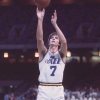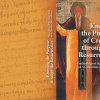Born in the Pittsburgh, Pennsylvania suburb of Aliquippa, and of Serbian descent, Pete had seemed to marvel his family and friends with his basketball ability since he was young. His father Press Maravich, former professional player turned coach, showed Pete the fundamentals starting at age 7. Pete would obsessively spend hours practicing ball control tricks, passes, head fakes and long range shots.
In 1966, Pete decided to attend Louisiana State University, and play for his father, who was the school's new head basketball coach. This is where Pistol Pete, along with his trademark floppy gray socks, became legendary.
Maravich was a three time first team All-American and was named The Sporting News' player of the year in 1970, and received the Naismith Award as well. He scored a personal record of 69 points versus Alabama during a game that year, and garnered numerous other awards and college records.
After graduating LSU in 1970, Maravich was the third selection in the first round of the National Basketball Association's (NBA) player draft and made league history when he signed a $1.9 million contract — one of the highest salaries at the time — with the Atlanta Hawks. He wasted little time becoming a prime-time player by averaging 23.2 points per game his rookie season.. He made the All-NBA First Team in 1976 and '77 and the All-NBA Second Team in 1973 and '78. He led the NBA in scoring in 1977 with a personal high 31.1 points per game. Maravich finished his career with the Utah Jazz and the Boston Celtics in 1980, where he played for one season alongside Larry Bird before retiring.
In ten NBA seasons, Maravich, a five-time NBA All-Star, scored 15,948 points in 658 games for a 24.2 ppg average (15th All Time). He led the league in scoring with 31.1 points per game in 1977. His NBA single game high, a 68-point explosion, came against the New York Knicks on February 25, 1977. He shares the record for most free throws made in a quarter with 14.
After a leg injury forced him to leave basketball in the fall of 1980, Maravich became a recluse. Through it all, Maravich said he was searching "for life." He tried yoga and Hinduism, something he called UF-ology, vegetarianism, living on only fruits, and finally, macrobiotics. Eventually, he embraced Christianity.
On January 5, 1988, while playing a pickup basketball game at the Church of the Nazarene in Pasadena, CA with a group that included Focus on the Family head James Dobson (Maravich was scheduled to appear on Dobson's radio show later that day), he collapsed and died of a heart attack at the age of only 40.
Maravich was inducted into the Basketball Hall of Fame in May of 1987. He was, and still is, the youngest player to be inducted.
Pete Maravich released the Pistol Pete's Homework Basketball video series in 1987. The series contains four different videos—one each on passing, ball-handling, shooting, and dribbling. The videos are meant for people of all ages who want to learn the great skills and drills that made him one of the greatest basketball players of all time.
After Maravich's death, Louisiana Governor Buddy Roemer signed a proclamation officially naming the LSU home court the Pete Maravich Assembly Center.
In 1991, a biographical film dramatizing his 8th grade season entitled, Pistol Pete, was released. In 1996, he was named one of the 50 greatest NBA players in history by a panel made up of NBA historians, former players, and coaches. He was the only deceased player on the list. His two sons. Jeson and Joshua, accepted the honor in his place. In 2005, ESPN-U named Maravich the greatest college basketball player of all time.
In years to come a number of Serbian basketball players came to play successfully in NBA: Vlade Divac, Predrag Stojakovic, Marko Jaric, Predrag Danilovic, Darko Paspalj, Zeljko Rebraca and others.






